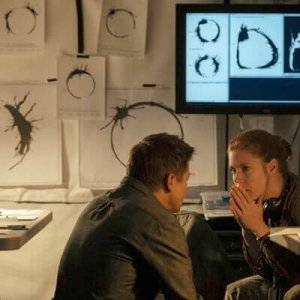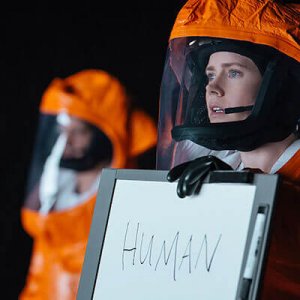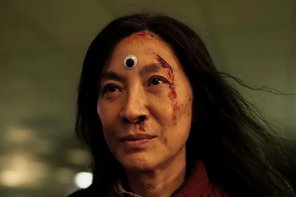There’s been some debate about how the studio cut the trailers for Arrival: more Independence Day than The Fountain. For such a minimalist, quiet film it seems the editors managed to find every scene of people running and military formations in order to portray a more mainstream actioner. Yes, there are creepy aliens and even one explosion, but those expecting 2012-level hysterics should adjust their expectations to 2001-level thoughtfulness. Arrival is a story revolving around language acquisition that is both existentially moving and quietly suspenseful. With an avant-garde score from Icelandic composer Jóhann Jóhannsson that is a character in its own right, and a stand-out performance from lead Amy Adams, I recommend you go see Arrival while it’s still in theaters. (This review is heavy with spoilers from here on out.)
What Is Your Purpose Here on Earth?
The first thing on the to-do list of alien contact is to discern their intentions. Are they here to destroy us or partner with us? Are they hostile, kind, indifferent, or just tourists? Enter linguist Dr. Louise Banks (Amy Adams), around whom the entire movie pivots. It’s a great role for Adams, recently under-used as Lois Lane, who must decipher the alien written language before China makes good on its threat against the mysterious visitors. Dr. Banks is mourning the loss of her young daughter, and lives a lonely life. Throughout the film we get glimpses of Banks’ joyous life with her daughter, from birth to death, and it’s this pathos that pulls us through the story. Adams has just the right notes of exhaustion, wonder, and dread during her scenes with the alien beings. In fact her co-stars, Jeremy Renner (physicist Ian Donnelly) and Forest Whitaker (Colonel Weber), are background characters at best. We never really get a sense of what they’re up to, as the film is told through the eyes and dreams of Dr. Banks. “Are you dreaming in their language?” Ian asks her at one point, and the dreams of Dr. Banks become the key to a beautiful meditation on memory in the film’s third act.
 After an early encounter with the alien beings, Dr. Banks breaks down the construction of a simple sentence to reveal how we take the complexities of written communication for granted. The military wants her to speed things up, but asking “What Is Your Purpose Here On Earth?” relies on assumptions about agency, personhood, identity, and other signifiers. In other words: it’s not that simple. Two of the creatures — floaty, knuckled, “heptapods” that trumpet, hoot, and pulse when speaking — work directly with Dr. Banks to share a mysterious technology with humanity. It’s not until Banks comes to understand their elaborate, inkblot symbolic language that two-way communication is possible. I would have liked a deeper look at how the language was finally deciphered. There were several “action” scenes of scientists working on huge printouts of the alien symbols, and lots of clicking computer screens projecting data, but there was a (months-long?) gap between first-contact and comprehension that could have included a look at how linguists attempt to work with unknown languages. Props to the props department for coming up with a technologically-appropriate user interface for Dr. Banks to write back-and-forth with the creatures. The app design was beautiful to look at and the functionality made sense. This is science-fiction, but it is firmly rooted in near-future technology.
After an early encounter with the alien beings, Dr. Banks breaks down the construction of a simple sentence to reveal how we take the complexities of written communication for granted. The military wants her to speed things up, but asking “What Is Your Purpose Here On Earth?” relies on assumptions about agency, personhood, identity, and other signifiers. In other words: it’s not that simple. Two of the creatures — floaty, knuckled, “heptapods” that trumpet, hoot, and pulse when speaking — work directly with Dr. Banks to share a mysterious technology with humanity. It’s not until Banks comes to understand their elaborate, inkblot symbolic language that two-way communication is possible. I would have liked a deeper look at how the language was finally deciphered. There were several “action” scenes of scientists working on huge printouts of the alien symbols, and lots of clicking computer screens projecting data, but there was a (months-long?) gap between first-contact and comprehension that could have included a look at how linguists attempt to work with unknown languages. Props to the props department for coming up with a technologically-appropriate user interface for Dr. Banks to write back-and-forth with the creatures. The app design was beautiful to look at and the functionality made sense. This is science-fiction, but it is firmly rooted in near-future technology.
But There’s a Paradox
The Arrival‘s story has two problems to solve: Learning the alien language, and preventing an international incident in response to the alien presence. The key to both is unlocked by Dr. Banks when she realizes becoming fluent in the alien language re-wires the human brain to see the future. Through these “future memories,” Banks is able to access information about events that haven’t happened yet. These aren’t static visions of a possible future, they seem to be participatory in some way. Banks is somehow in conversation with her future self; acts that take place in the future affect the past. The necessary solution is revealed to be a paradox, but only if we understand time to be linear. The story of Banks’ daughter, of her death at a young age from an incurable disease, turns out to be a future memory as well. During the denouement we see Dr. Banks make the choice to fall in love and get pregnant knowing all along that her daughter will die. We’re left with the question “If you knew how it would turn out, would it still be worth it?” Again the answer seems to be related to how we comprehend time. Because of humanity’s re-wired brains, we now “see” time the way the aliens do: all at once, interrelated. The past, present, and future are occurring simultaneously, more like places to visit than discrete events. In the same way we revisit the past by remembering it, we can experience the future. What does this mean for cause and effect? Will there be 7 billion paradox engines coming online as humans learn to speak alien?
Open to the Possibilities
In Christian theology much work is being done to more deeply understand how God interacts with his creation. One stream, popular in Europe and America for the last 500 years, says that God causes all things to happen: there is nothing outside his divine will. In this branch of theology there is a closed structure to how time operates, and it is much in line with Newtonian cause and effect. God in his sovereignty preordains all things to unfold as they do, good and bad, disaster and blessing. We see prophecy acting in this way: The prophet Isaiah remembered the future when he spoke about Immanuel, and it came to pass. But this deterministic model of God that much of the Western world was built upon sometimes yielded horrific results. Manifest Destiny, which insisted white Europeans were preordained to take the lands of and violently subdue non-Christian populations, was one such misuse of this doctrine.
 Philosophers (both believing and non-believing) and theologians have long sought to understand how there can be suffering and evil in the world and what God’s culpability in a closed universe would be. Simply put: if God causes all things then God must be the cause of suffering. In some views the answer is “Yes, but it’s only suffering from our temporal perspective. If we could see the outcome of all things as God ordains them we would understand the necessity of it.” In the 20th century Open Theism arose to challenge this view. Open Theism posits that God created an open universe which he experiences with us in some sense. Since God is infinite, God remembers an infinite number of futures, but the future is not fixed until it unfolds through the complex interactions of beings with complete freedom. In the Bible God is portrayed as “grieving” over the choices of his people. Why would a programmer-God grieve when his program ran the way it was intended? Maybe God is still sovereign, but his sovereignty is open. After all, true relationships can never be coerced or settled, but must exist within time and unfold through the free choices of their participants. (NOTE: For more on Open Theism I recommend the work of Greg Boyd, who is both a popularizer and an academic.)
Philosophers (both believing and non-believing) and theologians have long sought to understand how there can be suffering and evil in the world and what God’s culpability in a closed universe would be. Simply put: if God causes all things then God must be the cause of suffering. In some views the answer is “Yes, but it’s only suffering from our temporal perspective. If we could see the outcome of all things as God ordains them we would understand the necessity of it.” In the 20th century Open Theism arose to challenge this view. Open Theism posits that God created an open universe which he experiences with us in some sense. Since God is infinite, God remembers an infinite number of futures, but the future is not fixed until it unfolds through the complex interactions of beings with complete freedom. In the Bible God is portrayed as “grieving” over the choices of his people. Why would a programmer-God grieve when his program ran the way it was intended? Maybe God is still sovereign, but his sovereignty is open. After all, true relationships can never be coerced or settled, but must exist within time and unfold through the free choices of their participants. (NOTE: For more on Open Theism I recommend the work of Greg Boyd, who is both a popularizer and an academic.)
In Arrival, the future turns out to be both foreordained and dynamic. The science and metaphysics of time are never described in detail, and it’s hard to understand just how “remembering the future” would work, but that’s exactly the point. We can’t understand until we’ve fully internalized the alien gift which unlocks our minds. In the end Arrival is a story about mind, memory, and human relationships. Dr. Banks has to face ultimate concerns: how do love and suffering co-exist? Does love overcome pain? Surprising questions for an alien invasion movie.





